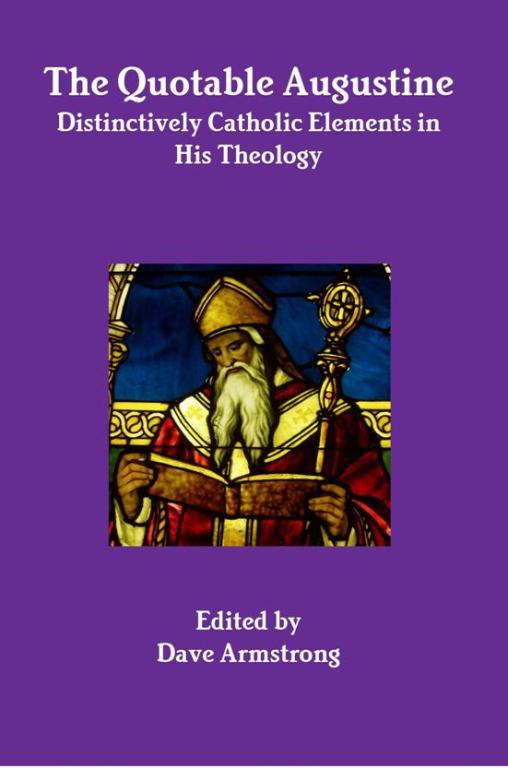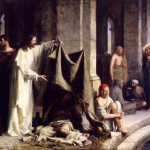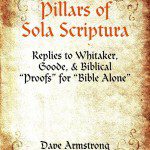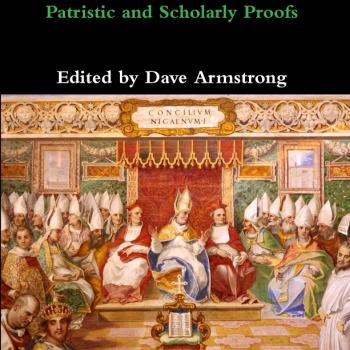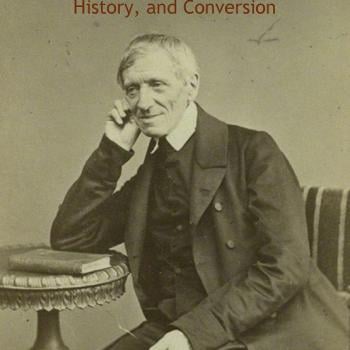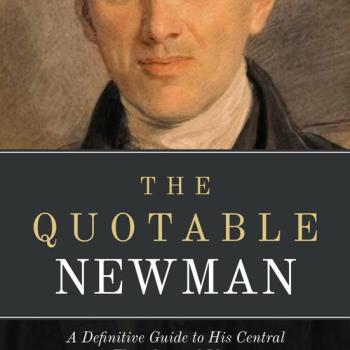***
***
That narrows down the already quite daunting task of selection and collection. I’m interested in St. Augustine’s theological views and passing these along to the reader, with the best and most pithy and descriptive quotes I can find.
Frequently, however, citations are relatively less “quotable” and more so a documentation of the theological views of St. Augustine: much like works of systematic theology that cite various Scriptures in order to establish specific theological tenets. In this sense, the book might function as a handy reference source for those who want to know what Augustine believed on a given topic: with full documentation and the absence of sometimes annoying footnotes.
The difference between this work and my two quotations books mentioned above, is its focus on “distinctively Catholic” elements in Augustine’s writings (thus adding a certain “apologetic” perspective to this volume).
Our esteemed Protestant brethren (especially Reformed Protestants, or Calvinists) often assert that St. Augustine’s views were closer to theirs than to the present-day Catholic Church. In this they follow the founders of their theological traditions: Martin Luther and John Calvin; though the “allegiance” of these two men to Augustine – closely examined – is selective and a “mixed record” at best.
My aim is to systematically document St. Augustine’s advocacy of positions that historic or traditional Protestantism has expressly rejected, and (conversely) detail his opposition to some doctrines or beliefs that it has (generally speaking) espoused.
Sometimes, it should be noted and clarified, the “oppositional” relevance of a category has more limited application. For example, several soteriological topics are specifically intended to be counter-evidences to Calvinist positions (whereas they wouldn’t be in opposition to Arminian or Wesleyan Protestantism). For example:
Apostasy (Falling Away from the Faith or Salvation)
Grace, Irresistible (Falsity of)
Hardening of the Heart
Synergy: Cooperation with God’s Grace as “Co-Laborers”
Total Depravity (Falsity of); Human Nature
Other topics are cited with opposition to “heterodox” skepticism mostly in mind:
Hell (Eternal Punishment)
Jonah and the Whale
Miracles
Scripture: Inerrant and Infallible
Scripture: Inspiration of
A sub-theme of the same opposition to theological liberalism has to do with the doctrine of God: presently being corrupted in many quarters by the sadly fashionable heretical scourges of “open theism” and “process theology”:
Free Will and God’s Foreknowledge
God: Impeccability of (Impossibility of Sinning)
God: Omniscience of
God: Outside of Time
God, Providence of
God: Sustainer of Creation
Jesus Christ: Supposed “Ignorance” of Certain Matters
The previous two groups of topics are areas where Catholics and evangelical or Reformed Protestants can heartily agree, for the most part, over against those who have chosen to reject doctrines held in common by Catholics, Protestants, and Orthodox alike.
Additionally, there are a few topics of particular relevance to our Eastern Orthodox brethren: “Holy Spirit: Procession of (Filioque Dispute)” (where arguably it is largely a semantic misunderstanding), and “Theosis; Divinization” (where St. Augustine and Catholics agree — since it is an explicitly biblical motif –, though this is seemingly not realized by many Orthodox).
Many great doctrines that are held in common by almost all historic Christian communions, are not included, since they are not exclusive to Catholicism; for example: the divinity of Christ, trinitarianism in the broadest sense, salvation by grace alone, or Jesus’ Resurrection and Second Coming. The subtitle of this book is truly the key to understanding its intention and goal: “Distinctively Catholic Elements in His Theology.”
Quotations are drawn from 42 separate works of St. Augustine, as well as collections of his letters and sermons, and arranged alphabetically under 157 topics. The translations used are all in the public domain (dating from the 19th century), and freely available online.
As was my custom in previous similar books, the quotations are also arranged chronologically within topics, insofar as that can be determined. This helps to clarify any development in Augustine’s views.
I utilized the dates that appeared in Allan Fitzgerald’s Augustine Through the Ages: An Encyclopedia (a wonderful 1999 work mentioned in the bibliography). In instances where a book took many years to complete (e.g., City of God; dated 413-427), I went by the earliest listed date, for the purpose of chronology.
These dates (as well as abbreviations used) appear in the initial bibliography, but not in the collection of quotations. The only dates listed under quotations are those of letters, or epistles: for obvious reasons.
Editorial input is kept to an absolute minimum: confined to an occasional bracketed clarification (usually a contextual matter or reference) or briefly stated fact considered to be indispensable in understanding some aspect of the quotation. My contribution consists in the collection and topical and chronological arrangement of the great father’s thoughts.
It was my joy and privilege to do so, and to pass along to readers a “capsulized version” of his wonderful theology and writing.
The presuppositions and “bias” of my own orthodox Catholicism will perhaps be in evidence in some places in this collection, but if so, I submit that this could scarcely be considered improper or even unexpected, given my stated emphasis and intentions.
****


